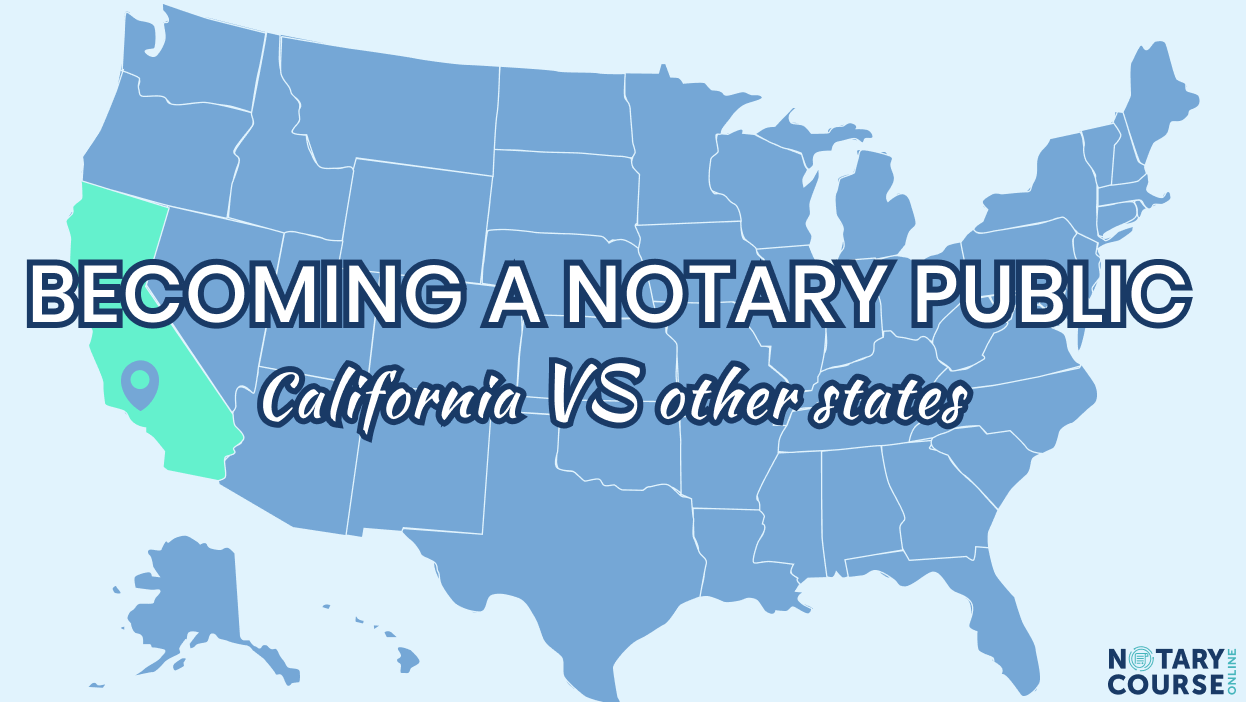California
Blog
Surprising Facts about Notary Public Exams

-
by Notary Course Online
- May 30, 2024
Introduction
Understanding notary public exams is crucial for anyone looking to become a notary. These exams are designed to ensure that notaries can perform their duties effectively.
However, there are some surprising facts about these exams that aspiring notaries often don’t know.
Knowing these facts can significantly influence your preparation strategy and overall success. Whether you are just starting out or looking to renew your commission, being well-informed is key.
This article aims to reveal nine surprising facts about notary public exams that will help you navigate this essential aspect of becoming a competent notary. For instance, did you know that when conducting notary appointments, you may encounter pets? Additionally, if you’re seeking a renewal notary course bundle to brush up on your skills, there’s a comprehensive option available to you. Lastly, if you’re considering expanding your services beyond traditional means, such as through mobile notary services, we have some tips to help attract more clients.
1. Not all states require tests!
Understanding the requirements for notary public exams is crucial for anyone considering this role. Surprisingly, not all states mandate an exam for becoming a notary public. This fact might be unexpected given the critical role notaries play in preventing fraud and verifying identities in various legal documents.
The majority of states do require notaries to pass an exam:
- Arkansas
- Arizona
- California
- Colorado
- Connecticut
- Hawaii
- Illinois
- Indiana
- Louisiana
- Maine
- Maryland
- Missouri
- Montana
- Nebraska
- Nevada
- New Jersey
- New York
- New Mexico
- North Carolina
- Ohio
- Oregon
- Pennsylvania
- Utah
- Vermont
- Wisconsin
- Wyoming
While less than half do not require any testing at all, including:
- Alabama
- Alaska
- Delaware
- District of Columbia
- Florida
- Georgia
- Idaho
- Iowa
- Kansas
- Kentucky
- Massachusetts
- Michigan
- Minnesota
- Mississippi
- New Hampshire
- North Dakota
- Oklahoma
- Rhode Island
- South Carolina
- South Dakota
- Tennessee
- Texas
- Virginia
- Washington
- West Virginia
Implications of Not Having Exams
Not requiring an exam has significant implications:
- Potential Lack of Preparedness: Without a standardized test, new notaries might lack the necessary knowledge to handle their responsibilities effectively.
- Inconsistency in Skills: The absence of exams can lead to a wide range of competency levels among notaries from different states.
- Public Trust: The credibility and trustworthiness of notaries could be questioned if they are perceived as insufficiently vetted.
For those preparing for an exam-required state, resources like the California Notary Practice Test can be invaluable in elevating your preparation and maximizing your chances of passing the exam on your first attempt.
Even if your state does not require a test, being informed about best practices and seeking education can only enhance your competence as a notary. This is why it’s still beneficial to explore resources like individual states’ notary handbooks and staying updated on Notary News Archives to keep yourself informed about industry news and best practices in the field.
2. Education Requirements for Notary Exams Across States
Education is crucial in preparing notaries to effectively and ethically perform their duties. Proper training helps ensure that notaries understand the legal implications of their actions and are equipped to prevent fraud.
States That Require Education but Not Exams
Some states prioritize education over testing when it comes to notary public exams. These states believe that comprehensive training can adequately prepare individuals for the responsibilities of being a notary without an exam. Examples include:
- Alabama
- Florida
- Idaho
In these states, aspiring notaries must complete specified educational courses before they can receive their commissions, ensuring they understand the laws and procedures they will be enforcing.
States That Do Not Require Education but Have Exams
Interestingly, some states mandate exams without requiring any formal education. This approach places the responsibility on individuals to self-study and prepare for the exam through available resources such as online courses or practice tests. Some examples are:
- Connecticut
- Hawaii
- Louisiana
- Maine (Note: Maine’s test is open book)
- Montana
- Nebraska (Note: Nebraska’s test is open book)
- New York
- Ohio
- Oregon Note: Oregon’s test is open book)
- Utah
- Wyoming Note: Wyoming’s test is open book)
Without mandatory education, applicants often turn to resources like practice tests to bolster their readiness. For instance, those preparing for the California exam can benefit from this comprehensive practice test designed specifically for California notaries.
Importance of Education for Notaries
The significance of education cannot be overstated, especially given the complex nature of notarial duties. Training programs provide insights into handling various situations, understanding state-specific laws, and recognizing fraudulent activities. A well-trained notary is less likely to make errors that could lead to legal complications or financial losses.
To further emphasize the importance of education, it’s worth noting that some states have disciplinary actions and guidelines in place for notaries who fail to adhere to professional standards. Familiarizing oneself with these guidelines can help ensure ethical practices are maintained.
Understanding these differing requirements across states helps prospective notaries navigate their paths more effectively, ensuring they meet all necessary criteria to serve their communities responsibly. It is important to note that by accessing the provided resources, you agree to the terms of service associated with them.
3. The Role of Education and Training in Being a Competent Notary
Understanding the importance of education and training for notaries is critical to ensuring the integrity of the notary process. A prime example highlighting this necessity is the foreclosure crisis of 2010. During this period, improper notary procedures led to widespread issues, often referred to as “robo-signing.” In many cases, lenders and third-party contractors notarized documents without the signer’s presence or consent, leading to legal challenges and significant financial repercussions.
Benefits of Well-Trained Notaries
- Compliance with Legal Standards: A well-trained notary understands and adheres to state-specific laws and regulations, reducing the risk of fraudulent activities.
- Accuracy in Documentation: Proper training ensures that notaries can accurately identify signers, witness signatures, and maintain records.
- Professionalism in Practice: Training programs often cover best practices for maintaining professionalism, including handling sensitive information securely.
For instance, states like California require up to 6 hours of mandatory training before taking the notary public exam. This rigorous preparation helps ensure that notaries are well-equipped with the knowledge they need to perform their duties effectively. If you’re looking for high-quality California Jurat Stamps, these can be easily obtained online from reputable sources.
Investing in quality education and practical training resources can significantly enhance a notary’s competence. Notaries who have undergone thorough training are less likely to make errors or engage in improper practices, benefiting both themselves and the public they serve.
Mobile notaries, in particular, face unique challenges due to their constantly changing work environments. To navigate these challenges successfully, it’s important for them to understand what they may come up against. This article on common challenges faced by mobile notaries provides valuable insights and guidance.
Renewing a notary public commission in California involves several steps. If you’re a California notary seeking to renew your commission, these 5 steps to renew a notary public commission in California will help streamline the process and ensure you meet all the necessary requirements.
4. States with Particularly Challenging Notary Exams
4.1 New York
Minimum passing score and restrictions during the exam
New York is known for its stringent notary public exams. To pass, you must achieve a minimum score of 70%. This might seem attainable, but the conditions under which the exam is administered make it particularly challenging:
- Heavily proctored: The one-hour exam is closely monitored to prevent cheating.
- No reference materials allowed: You can’t bring notes, books, or any other reference materials.
- No electronic devices: Wireless mobile devices are strictly prohibited.
These restrictions ensure that only those who have thoroughly prepared can succeed.
Challenges faced by individuals preparing for the exam
Aspiring notaries in New York face several hurdles:
- Lack of mandatory training: Unlike some states, New York does not require any formal education before taking the notary exam. This leaves individuals on their own to find suitable preparation resources.
- Complex legal knowledge: The exam covers intricate aspects of New York’s notary laws, which can be difficult to master without structured guidance.
- High stakes and pressure: Given the importance of achieving a passing score on this heavily controlled test, the pressure can be immense, adding another layer of difficulty.
For preparation, many turn to online courses and study guides. Websites like Notary Course Online offer various resources such as study guides, handbooks, and newsletters to help candidates navigate the complexities of the exam. These platforms also provide insights into other state-specific exams like the California pocket embosser requirements and the significance of notarization, which can be beneficial for individuals seeking a comprehensive understanding of the subject matter.
4.2 California
California is renowned for its stringent requirements in becoming a notary public. The state has implemented several measures to ensure that only qualified individuals are granted the notary public commission.
Mandatory Training
Prospective notaries in California must successfully complete a state-approved training program. This comprehensive training, which can span up to 6 hours, covers essential topics relevant to notarial acts and legal responsibilities.
Background Check
In addition to education, applicants undergo a thorough background check that includes fingerprinting. This step plays a crucial role in upholding the integrity of the notary profession by filtering out individuals with disqualifying criminal records.
The minimum exam score adds another layer of difficulty. To pass the California notary public exam, candidates must achieve at least 70%. The questions are drawn from the Notary Public Handbook, which is available online.
Available resources for preparation include:
- Online courses specifically tailored to cover the material in the Notary Public Handbook.
- Study guides and practice tests that help familiarize candidates with the exam format and types of questions asked.
For those navigating this rigorous process, Notary Course Online offers comprehensive preparation resources specifically designed for California notaries. Additionally, their knowledge center provides valuable tips that aid candidates in understanding both the content and structure of the exam.
By meeting these stringent criteria, California ensures that its notaries are well-prepared to handle the responsibilities and challenges they might face. This rigorous approach highlights the state’s commitment to maintaining high standards within the profession.
For further guidance on excelling as a notary public, you may also find these notary public tips insightful.
4.3 North Carolina
North Carolina is renowned for its rigorous requirements for notary public exams. The state mandates a minimum passing score of 80% for the initial commission, setting a high standard that distinguishes North Carolina’s commitment to ensuring that only well-prepared individuals become notaries.
Renewal Process in North Carolina
For those seeking to renew their commission, North Carolina has implemented additional rules:
- Applicants must undergo a renewal test, which lasts just 30 minutes.
- They are afforded two opportunities to retake the test within a 30-day period, if they fail initially.
- Failure to pass within these attempts will result in denial of recommissioning.
Key Points:
- Minimum Score for Initial Commission: 80%
- Restrictions on Renewal Tests: A 30-minute test with only two retest opportunities within a 30-day window.
These stringent requirements often leave aspiring notaries in North Carolina searching for comprehensive study materials and preparation courses. Recognizing the significance of thorough preparation can greatly enhance the chances of successfully passing these exams and maintaining one’s commission.
Moreover, it is crucial to maintain accurate notarial records throughout your career. For instance, using a reliable California Notary Journal can help you organize and record important details during your appointments. Such resources are equally valuable in North Carolina, where attention to detail is of utmost importance.
Conclusion
Understanding these surprising facts about notary public exams is crucial for anyone aspiring to become a notary. These insights can prepare you for the varying requirements and challenges across different states, ensuring you’re better equipped to navigate the process.
Key takeaways include:
- State-specific requirements: Not all states mandate exams, while some require extensive education or training.
- Importance of training: Proper education can prevent errors like those seen in the foreclosure crisis.
- Challenging states: New York, California, and North Carolina have particularly stringent requirements.
For those looking to dive deeper into the specifics of notary public exams or seeking resources for preparation, visit the Notary FAQ page provided by Notary Course Online. This comprehensive FAQ covers frequently asked questions about notary public classes, qualifications, and types of online courses available in California.
You might also want to explore their courses, which are tailored to meet various state requirements. Engaging with these resources can provide you with the knowledge and tools needed to successfully become a competent and ethical notary public.
FAQs (Frequently Asked Questions)
Do all states require notary public exams?
No, not all states require notary public exams. There are some states that do not have exam requirements for individuals to become a notary public.
What are the education requirements for notary exams across states?
Education requirements for notary exams vary across states. Some states require education but not exams, while others do not require education but have exam requirements.
How important is education and training in being a competent notary?
Education and training play a crucial role in being a competent notary. Well-trained notaries can help prevent issues such as improper procedures during critical situations like the foreclosure crisis.
Which states have particularly challenging notary exams?
States like New York, California, and North Carolina are known for having particularly challenging notary exams with specific requirements and restrictions.
What are the New York exam requirements for becoming a notary public?
The New York exam has minimum passing score requirements and specific restrictions during the exam. Individuals preparing for the exam may face various challenges due to its difficulty.
What are the California exam requirements for becoming a notary public?
California has tough exam requirements, including mandatory training and background checks. Additionally, there are minimum exam score requirements and available resources for preparation.






 Congratulations!
Congratulations!